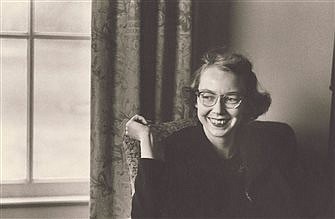‘Flannery’ is documentary on notable 20th century writer
July 17, 2020 at 11:29 a.m.

Her remarkable life is both recounted and celebrated in the admiring documentary "Flannery" (Long Distance Productions).
Filmmakers Elizabeth Coffman and Jesuit Father Mark Bosco marshal home movies, archival television footage and interviews with O'Connor's friends and relatives to evoke her fiercely held faith and wickedly clever imagination. Scholars and fellow scribes, including Mary Gordon and Alice Walker, put in an appearance. Actress Mary Steenburgen voices O'Connor.
"Flannery" may lack the tang of its subject's Southern Gothic novels and tales, meditations on grace recognized and insight achieved by sometimes outlandish characters amid frequently bizarre circumstances. But viewers unfamiliar with her work will be motivated to explore it.
Established fans, for their part, will appreciate the chance to pay an extended visit to Andalusia, the picturesque farm near Milledgeville, Georgia, to which lupus – the disease that eventually caused her early death – long confined O'Connor. The simple household seems haunted, in a strangely pleasant way, by her departed spirit.
O'Connor did not write for children, and this profile of her is unsuitable for them as well. Its analysis of one of her tales involving a serial killer and another in which a hermaphrodite plays a central role, for example, suggests a mature audience.
Many parents of older teens, on the other hand, may consider “Flannery” appropriate for them. All the more so since this literary biography is not only educational but spiritually enriching as well.
O'Connor was a dauntless champion of faith who, in her writing, subtly strove to communicate with unbelievers. A daily communicant, she also read a chapter of the Bible and a section of St. Thomas Aquinas' "Summa Theologica" each day.
By all indications, O'Connor patiently accepted the hardships resulting from her malady. Even as her end approached, moreover, she worked on in the hospital to complete her last collection of stories. Her example of religiously inspired courage is well-deserving of the tribute paid to it in this thoroughly enjoyable movie.
For screening information, go to: https://www.flanneryfilm.com/calendar.
The film contains images of violence, references to sexuality and fleeting crass language. The Catholic News Service classification is A-III – adults. Not rated by the Motion Picture Association.
Mulderig is on the staff of Catholic News Service.
Related Stories
Sunday, December 14, 2025
E-Editions
Events
Her remarkable life is both recounted and celebrated in the admiring documentary "Flannery" (Long Distance Productions).
Filmmakers Elizabeth Coffman and Jesuit Father Mark Bosco marshal home movies, archival television footage and interviews with O'Connor's friends and relatives to evoke her fiercely held faith and wickedly clever imagination. Scholars and fellow scribes, including Mary Gordon and Alice Walker, put in an appearance. Actress Mary Steenburgen voices O'Connor.
"Flannery" may lack the tang of its subject's Southern Gothic novels and tales, meditations on grace recognized and insight achieved by sometimes outlandish characters amid frequently bizarre circumstances. But viewers unfamiliar with her work will be motivated to explore it.
Established fans, for their part, will appreciate the chance to pay an extended visit to Andalusia, the picturesque farm near Milledgeville, Georgia, to which lupus – the disease that eventually caused her early death – long confined O'Connor. The simple household seems haunted, in a strangely pleasant way, by her departed spirit.
O'Connor did not write for children, and this profile of her is unsuitable for them as well. Its analysis of one of her tales involving a serial killer and another in which a hermaphrodite plays a central role, for example, suggests a mature audience.
Many parents of older teens, on the other hand, may consider “Flannery” appropriate for them. All the more so since this literary biography is not only educational but spiritually enriching as well.
O'Connor was a dauntless champion of faith who, in her writing, subtly strove to communicate with unbelievers. A daily communicant, she also read a chapter of the Bible and a section of St. Thomas Aquinas' "Summa Theologica" each day.
By all indications, O'Connor patiently accepted the hardships resulting from her malady. Even as her end approached, moreover, she worked on in the hospital to complete her last collection of stories. Her example of religiously inspired courage is well-deserving of the tribute paid to it in this thoroughly enjoyable movie.
For screening information, go to: https://www.flanneryfilm.com/calendar.
The film contains images of violence, references to sexuality and fleeting crass language. The Catholic News Service classification is A-III – adults. Not rated by the Motion Picture Association.
Mulderig is on the staff of Catholic News Service.










